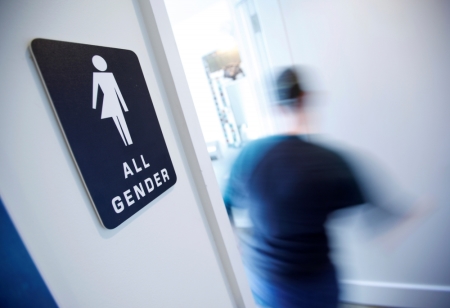Students walkout after school district covers up urinals amid backlash to trans bathroom policy

Over 100 students at a New Hampshire school district staged a walkout following the school board’s decision to cover up urinals and restrict access to shared spaces in locker rooms amid parents' outrage over a policy allowing trans-identified students to use restrooms in accordance with their gender identity.
The New Milford School District voted 4-1 at a school board meeting last Monday to limit the number of people allowed in school restrooms to the number of stalls in the bathroom and cover up urinals with trash bags as the district looks into the price of installing all-stall restrooms.
Students at Milford High School, and even some teachers and administrators, responded to the decision last Friday by staging a walkout to protest the new policy.
Superintendent Christi Michaud told The Boston Globe that her team has fielded many concerns this week from Milford’s male high school students.
"Nobody asked for this," a student named Autumn Diveley told WMUR9. "Nobody but the few parents who complained to the school board asked for this."
Diveley thinks that the change makes things difficult for LGBT students, claiming that it creates “a complex system of inequality.”
Some students who participated in the protest disagreed with the board’s policy change but were unsure about allowing trans-identified students to enter a bathroom that does not align with their biological sex.
"As a female, I don't think it's safe to have males in our bathroom," a student named Lena Silva told the outlet.
The New Milford School District did not immediately respond to The Christian Post’s request for comment.
In response to an inquiry from WMUR9, some school board members praised the students for expressing their opinion.
"They held a peaceful protest that was both orderly and message-driven, articulate and positive. It made me proud to be a Milford resident and school board member,” Chairwoman Judi Zaino said.
School board secretary Joseph Vitulli, who opposes the decision, believes that the students’ actions make it clear that the board “must deal with this issue ASAP" because “immediately changing” the bathroom policy was “not well thought out by the board.”
School board member Noah Boudreault, who proposed the prohibition on urinals, told The Globe that his proposal was somewhat of a "compromise." He told WMUR9 that he has heard from a number of students and that the policy change “was in part to collect data and make adjustments if necessary."
The board enacted the recent change in response to a proposal brought forward to alter the district’s bathroom policy permitting trans-identified students to use whichever bathroom they choose.
The new proposal would have required students to use restrooms that correspond with their biological sex.
According to WMUR9, the board said it would investigate the cost of instituting all-stall bathrooms.
Oklahoma enacted a similar policy last May when Gov. Kevin Stitt signed Senate Bill 615.
The bill requires “each public school and public charter school that serves students in prekindergarten through twelfth grades in this state” to “require every multiple occupancy restroom or changing area designated” either “for the exclusive use of the male sex” or “for the exclusive use of the female sex.”
However, one of the provisions under the bill requires schools to provide accommodations to students who would prefer to use a single-occupancy restroom or changing room.
In December, the 11th U.S. Circuit Court of Appeals upheld a Florida school district policy prohibiting trans-identified students from using bathrooms that do not align with their biological sex. The federal appeals court ruled in a 7-4 decision that the St. Johns County School Board's bathroom policy is not a violation of federal civil rights law, nor does it discriminate against trans-identified students.
"The school board's bathroom policy is clearly related to — indeed, is almost a mirror of — its objective of protecting the privacy interests of students to use the bathroom away from the opposite sex and to shield their bodies from the opposite sex in the bathroom, which, like a locker room or shower facility, is one of the spaces in a school where such bodily exposure is most likely to occur," Judge Barbara Lagoa wrote for the majority.
In 2021, the U.S. Supreme Court declined to hear an appeal brought by a Virginia school district that lost in the lower court to a former student who sued for the right to use bathrooms and locker room facilities based on gender identity.
Samantha Kamman is a reporter for The Christian Post. She can be reached at: samantha.kamman@christianpost.com. Follower her on Twitter: @Samantha_Kamman





















